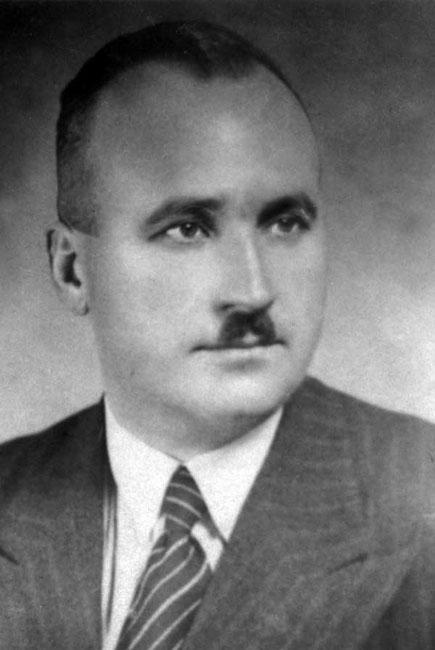
Dimitâr Peshev
24 February 2015
On Thursday, February 26, 2015, a ceremony posthumously honoring Dimitar Peshev from Bulgaria, as Righteous Among the Nations will take place at Yad Vashem. The ceremony will be attended by Israel's ambassador to Bulgaria, H.E. Mr. Dimitar Mihaylov, Yad Vashem Chairman Avner Shalev, Director of the Department of the Righteous Among the Nations, Irena Steinfeldt, Chairman of the Association of Immigrants from Bulgaria Joseph Kiosso, Vice Chairman of the National Authority for Ladino Culture Moshe Shaul, Holocaust survivors, family and friends and members of the Commission for the Designation of the Righteous Among the Nations.
On January 10, 1973, Peshev was awarded the title of Righteous Among the Nations by Yad Vashem for his unwavering struggle against the plans to deport Jews to death camps. Peshev's name is engraved on the Wall of Honor in the Garden of the Righteous Among the Nations at Yad Vashem. His rescue story can be read online on Yad Vashem's website, and his story was also featured in the just recently closed temporary exhibition, "I Am My Brother's Keeper".
Peshev passed away a few weeks after the decision granting him the title of Righteous Among the Nations and, given the political circumstances of the time, it was impossible to hold a ceremony honoring him. Therefore, an event will take place at Yad Vashem this week honoring Dimitâr Peshev. The medal and certificate of honor will be presented to Neli Pesheva, niece of Righteous Among the Nations Dimitâr Peshev, who is arriving especially from Bulgaria to attend the ceremony and accept the medal and certificate on her family's behalf. The medal and certificate will be presented by Yad Vashem Chairman Avner Shalev.
A memorial ceremony in the Hall of Remembrance will be held at 13:00 followed by the awarding of the medal and certificate in the Auditorium and then will continue in the Garden of the Righteous Among the Nations. The events will take place in Hebrew and Bulgarian. The event is open to the press, in coordination with the Media Relations dept. 02 644 3410
The Rescue Story
In February 1942, the Bulgarian government signed an agreement to deport 20,000 Jews from Thrace and Macedonian - territories that Bulgaria had received as a result of its alliance with Germany. However, since the number of Jews in these areas fell short of 20,000, it was agreed upon to make up the difference with 6,000 Jews from Bulgaria itself. The first such group of Bulgarian Jews was to come from Kyustendil. When rumors about the intended deportations reached Peshev, he acted promptly and traveled to Kyustendil. There he met with the assistant chief of police who told him about the planned roundups. He also received telegrams from both Jews and non-Jews who implored him to intervene. Peshev, who two years earlier had accepted the anti-Jewish measures as necessary, felt that he had reached a point where acquiescence was no longer an option. Rather than ignore the evidence and continue to persuade himself that the pact benefited Bulgaria, he examined the consequences of the agreement and decided that he must act. He organized a parliamentary delegation and went to see Petr Gabrovski, the Minister of Interior.
Peshev was not satisfied with the Minister's assurances, and he decided to bring the matter before the parliament. On March 17, he wrote a letter of protest and convinced 42 parliamentarians to sign it. He ignored the Prime Minister's demand not to submit the letter, and it was discussed by the majority caucus on March 23, 1943. The session turned into a confrontation between Peshev and the Prime Minister. In order to intimidate the signatories of the petition, the Prime Minister insisted on having each one of them stand up and declare their support of the letter. This caused some of them to falter. Under the Prime Minister's pressure, only 30 of the original 42 stood fast. As it turned out, the debate actually focused on the parliamentarians’ loyalty, not on the deportees’ fate.
In a final vote, the party declared its support of the Prime Minister and decided to censure Peshev. On March 30, Pehsev was forced to resign as the Parliament's Vice President, and his request to be allowed to speak was rejected. Peshev was politically ostracized, but other political and clerical voices echoed his protest, and the Bulgarian government was forced to abandon its plans to deport the Jews of Bulgaria. The deportations from Bulgaria were suspended, but while the political negotiations were taking place, the Jews of Thrace and Macedonia were being deported by the Bulgarian authorities. The last transport to the death camps left on March 29, 1943.
In 1944, after Bulgaria came under Soviet control, Peshev was charged with antisemitism and collaboration with the Germans. He was sentenced to 15 years in prison, but was released after serving one year.
On January 10, 1973, Peshev was awarded the title of Righteous Among the Nations by Yad Vashem for his unwavering struggle against the plans to deport Jews to death camps. Peshev passed away a few weeks after the decision and, given the political circumstances of the time, it was impossible to hold a ceremony.
Read more about the Righteous Among the Nations >>>






